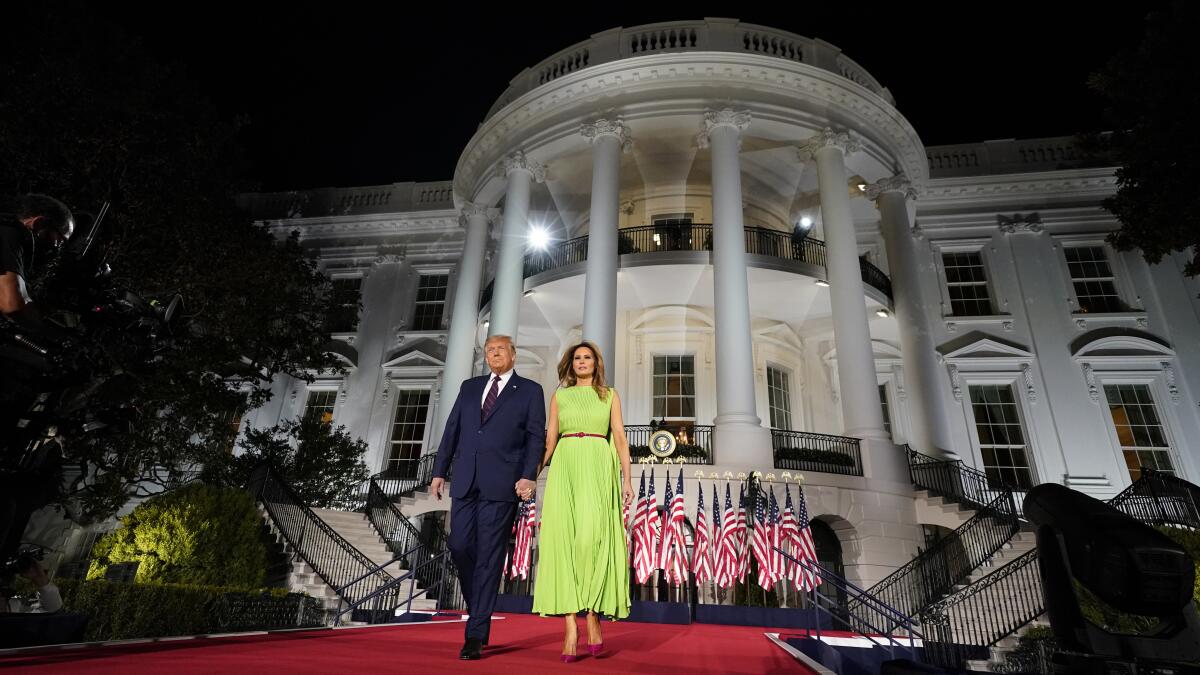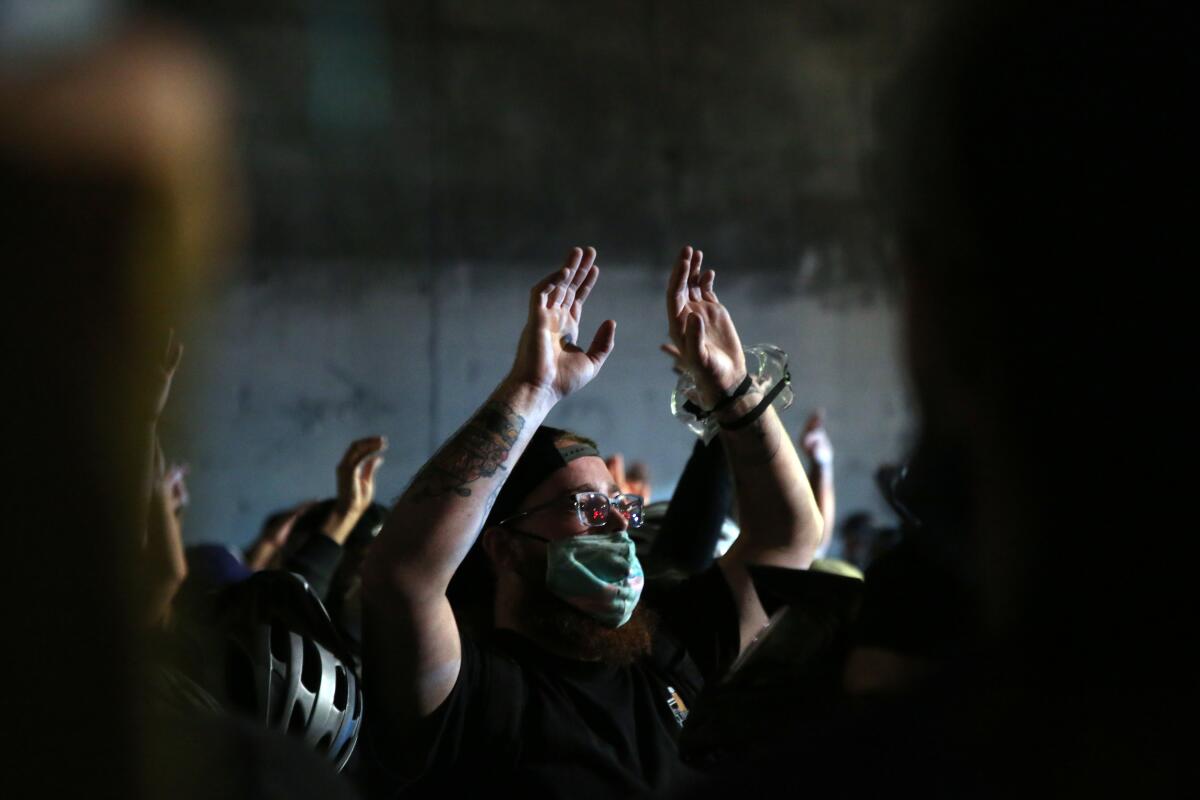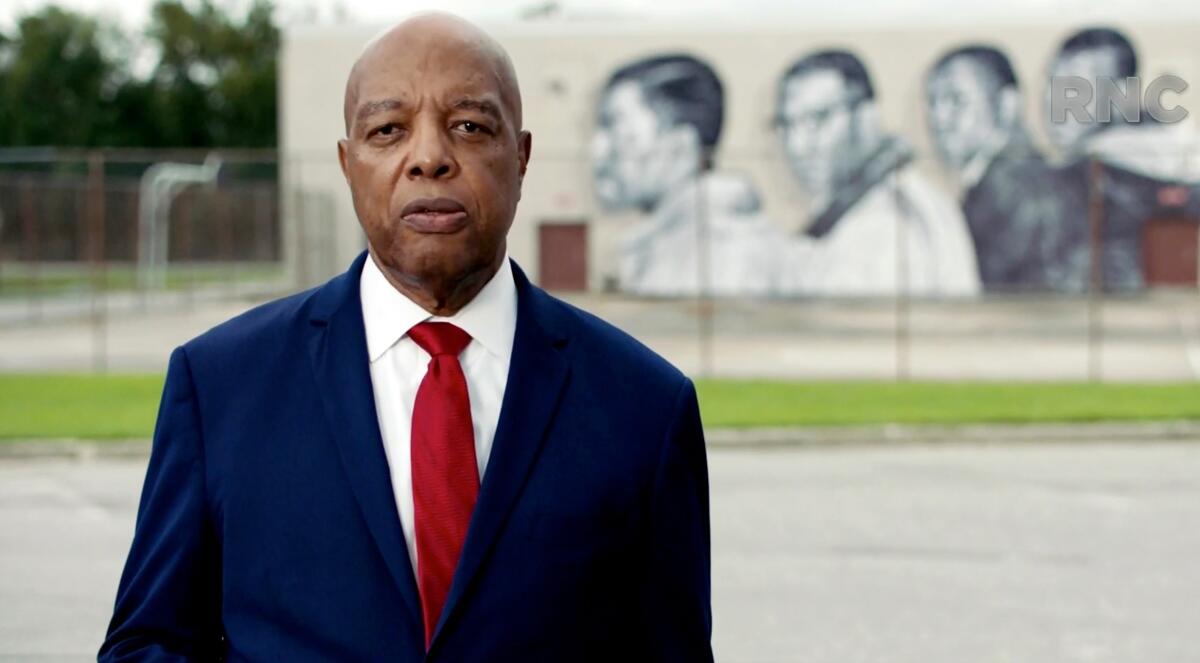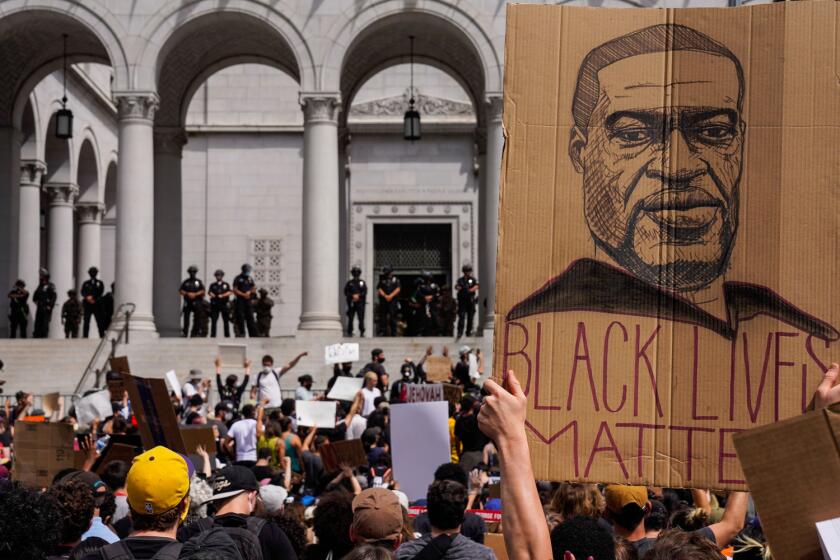News Analysis: Trump sidesteps America’s racism and police brutality and labels protests ‘mob rule’

- Share via
President Trump’s speech accepting the Republican presidential nomination gave him an opportunity to do something he has so far failed to do in explicit terms.
It gave him a prime-time TV platform to reassure Black Americans that he understood the grief, rage and aching sense of deja vu that strike them when they see footage of another Black person killed or injured by police.
He didn’t take it.
Instead, while standing on a stage outside the White House, Trump accused demonstrators of bringing anarchy to the nation’s cities. He sidestepped America’s long-standing racism and the police brutality against Black people that have sent protesters into the streets.
“When there is police misconduct, the justice system must hold wrongdoers fully and completely accountable,” Trump said. “But we must never allow mob rule.”
In the four days leading up to Thursday’s speech, one speaker after another at the Republican National Convention dismissed and misconstrued protests held in cities large and small.
They’ve been led by Black Lives Matter activists and other groups in response to the police killings of George Floyd and Breonna Taylor, the vigilante-style fatal shooting of Ahmaud Arbery by heavily armed white men, and other incidents including the police shooting of Jacob Blake on Sunday in Kenosha, Wis.

Kenosha police officers shot Blake at least seven times in the back as his three boys watched from their father’s SUV; he was left paralyzed from the waist down. The shooting set off days of sometimes volatile demonstrations in the city of 100,000, which is located halfway between Chicago and Milwaukee.
Trump sounded resolute when calling on Americans to respect law enforcement, vowing to greet civil unrest with “law and order.”
“In the strongest possible terms, the Republican Party condemns the rioting, looting, arson and violence we have seen in Democrat-run cities like Kenosha, Minneapolis, Portland, Chicago and New York and many others,” he said.
What was missing from his speech, and from the convention itself with a few exceptions, were expressions of sympathy for Blake’s loved ones and Floyd’s. Nor did Trump acknowledge the dread and fear for their lives that many Black people often feel during encounters with police.
Floyd, who was unarmed, cried out “I can’t breathe” more than 20 times and uttered “they’ll kill me” in his dying moments as a white Minneapolis police officer knelt on his neck and taunted him.
On Tuesday night in Kenosha, a white teen opened fire on protesters, killing two and wounding another. He was allowed to walk past officers and leave the scene carrying a semiautomatic rifle as witnesses called out that he was the gunman.
Kyle Rittenhouse, 17, was arrested the next day in nearby Antioch, Ill., on suspicion of murder.
This once industrial and union town, like much of America, is facing a reckoning after the police shooting of Jacob Blake.
Rittenhouse, who posted frequently on social media in support of police, in January shared a TikTok video taken from his front-row seat at a Trump rally in Des Moines, according to Buzzfeed News.
Republicans who spoke at the convention did not decry the armed militia members and vigilantes who’ve appeared at protests in Kenosha. They didn’t bring up the spectacle of a white teenager being permitted to freely patrol the streets with an assault-style rifle, something many Black Americans couldn’t conceive of doing without being questioned or arrested or worse.
Instead, the RNC aired a speech by Mark and Patricia McCloskey, a white couple lionized by conservatives after pointing their guns at protesters peacefully marching by their mansion in St. Louis in June. The couple face felony charges.
Trump called the notion that they would be prosecuted “a disgrace.”
His double-standard isn’t new. He responded to the protests that erupted in Minneapolis after Floyd’s killing by tweeting, “When the looting starts, the shooting starts.”
Even so, Trump has brush off accusations that his incendiary rhetoric incites vigilantes.
At the convention, a procession of Black Americans put their credibility on the line, using their struggles against poverty and prejudice to persuade Americans who find fault with Trump that they’ve misjudged him. They contended that Trump, who signed a prison-reform bill, created economic development zones in depressed Black communities and helped secure funding for historically black colleges and universities, is nothing close to being a racist who inflames the nation’s tensions.
“I know what racism looks like in America,” said former NFL player Jack Brewer, a self-described lifelong Democrat who reflected on having to fight racist skinheads when he was growing up in Texas. “It has no resemblance to President Donald Trump.”
Trump’s and Biden’s reactions to racial injustice and protests illuminate how they approached the issue of race throughout their political careers.
Another speaker, Clarence Henderson, made history in 1960 when he and other Black student activists staged sit-ins at a Woolworth’s department store lunch counter in Greensboro, N.C. Their activism helped bring an end to Jim Crow segregation in the South.

“That’s what actual peaceful protest can accomplish,” said Henderson, who accused today’s activists of being Marxists determined to “tear down the fabric of America.”
Henderson said Americans who don’t realize how much the Republican Party, Trump included, has done for Black people “don’t know their history.”
But on Thursday, Trump didn’t seem to grasp the painful history of the Black Americans whose rights Henderson fought for 60 years ago.
“Our American ancestors sailed across the perilous ocean to build a new life on a new continent,” Trump said. “They braved the freezing winters, crossed the raging rivers, scaled the rocky peaks, trekked the dangerous forests, and worked from dawn until dusk. These pioneers didn’t have money. They didn’t have fame.”
He failed to mention that half a million of those newcomers were captive Africans — people who were packed into disease-ridden slave ships and worked without compensation as the property of their owners, and who had to fight for their basic human rights long after being liberated.
Throughout his presidency, Trump has seldom resembled the man his Black supporters described — a leader with a kind soul who’s a champion of racial tolerance and diversity.
He launched his 2016 bid by portraying Mexican migrants as rapists and murderers. The president has repeatedly fanned anti-Asian sentiment by referring to the COVID-19 pandemic the “China virus,” including in his speech Thursday on the White House lawn.
His warning to “suburban housewives” clearly implying that the poor and people of color are coming to infiltrate their communities because of Democratic fair housing rules ignores the reality that many of those communities, from suburban Atlanta to the suburbs of Sacramento, San Francisco and L.A., are already culturally and economically diverse.
The police killing of George Floyd and resulting protests have led white Americans to reckon with racism more vigorously than at any moment in recent history.
He tweeted that four congresswomen of color should “go back” where they came from, even though only one of them was born outside the U.S. Trump has also fueled racist conspiracy theories that accused President Obama and the Democratic vice presidential nominee, California Sen. Kamala Harris, of not being natural-born U.S. citizens.
And he’s called Black women, including Harris and journalists April Ryan and Yamiche Alcindor, “nasty.”
Many Black voters take issue with Trump’s response to the COVID-19 pandemic, which has taken a disproportionately deadly toll on Black and Latino Americans.
In grief, Detroit’s Marsha Music writes tender goodbyes, praise-filled shoutouts as the coronavirus outbreak ravages black communities
Earlier this year, while COVID-19 killed generations of Black families in Michigan, white demonstrators, some armed with guns and automatic rifles and not wearing masks, entered the state’s Capitol to protest a stay-at-home order.
Rather than condemn those demonstrators, the president tweeted that they were “very good people” who only “want their lives back,” and he urged the Democratic governor to “make a deal” with them.
And after a deadly white supremacist rally in Charlottesville, Va., in 2017, Trump defended the demonstrators, saying that there were “fine people” among them.
Some Black Americans have grown so fearful that they might be targeted by white supremacists that they’ve started taking their safety into their own hands too. Black people now account for the largest increase in U.S. gun purchases of any demographic group, according to Black Enterprise magazine.
Harris channeled the exasperation that many Black people feel in a pointed attack on Trump over his handling of the pandemic and protests. “The reality is that the life of a Black person in America has never been treated as fully human — and we have yet to fulfill that promise of equal justice under law,” she said Thursday.
Jacob Blake’s mother, Julia Jackson, set aside her personal anguish over her son’s shooting to plead with her fellow Americans to think about where the country’s headed, and come together.
“We need healing,” Jackson said at a news conference Tuesday. “As I pray for my son’s healing — physically, emotionally and spiritually — I also have been praying even before this for the healing of our country.”
Trump could’ve matched Jackson’s display of grace during his 70 minutes at the microphone Thursday by echoing her compassionate and unifying words to the nation.
He instead congratulated himself for being president, and in an attack on his Democratic opponent, Joe Biden, spat out the word “empathy” — as a pejorative.
More to Read
Get the L.A. Times Politics newsletter
Deeply reported insights into legislation, politics and policy from Sacramento, Washington and beyond. In your inbox twice per week.
You may occasionally receive promotional content from the Los Angeles Times.












